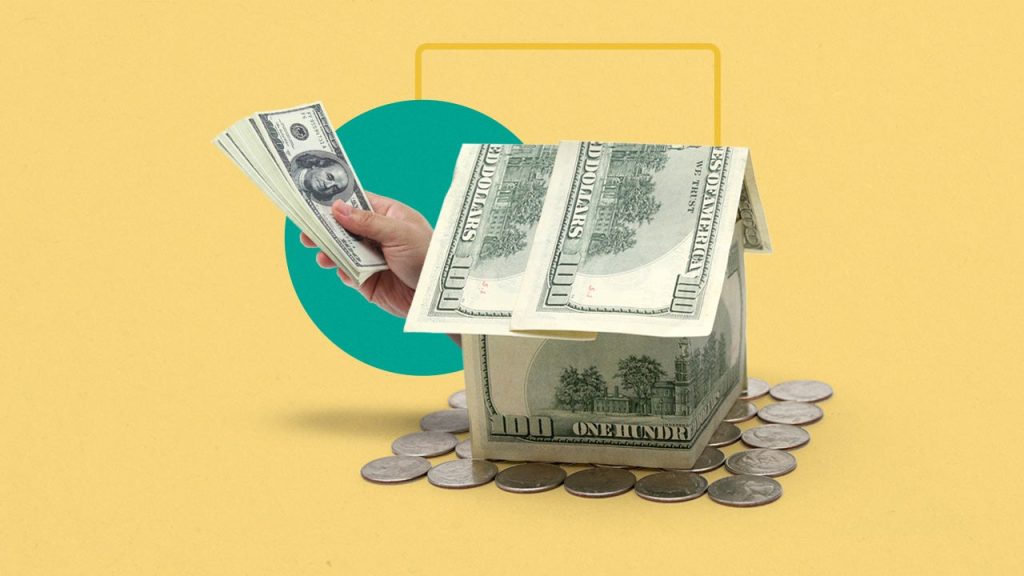Images by Getty Images; Illustration by Issiah Davis/Bankrate
Our writers and editors used an in-house natural language generation platform to assist with portions of this article, allowing them to focus on adding information that is uniquely helpful. The article was reviewed, fact-checked and edited by our editorial staff prior to publication.
Key takeaways
- Refinancing your mortgage costs anywhere between 2 percent and 5 percent of the amount of the new loan. These closing costs might include an application, origination and home appraisal fees.
- To determine whether it’s worth paying to refinance, figure out when you’ll break even — the point when the savings on your new mortgage surpass the upfront cost.
- You can save on the cost of refinancing by boosting your credit score, comparing mortgage terms and rates and negotiating closing costs.
How much does it cost to refinance?
The average mortgage refinance runs $2,375 in closing costs, excluding any taxes, according to ClosingCorp. These costs vary primarily according to the size of your loan and where you live. Generally, you can expect to pay between 2 percent and 5 percent of the new loan balance in closing costs. If you’re refinancing a $200,000 mortgage, say, you might be looking at anywhere between $4,000 and $10,000 in closing costs.Here’s a breakdown of common closing costs:
| Closing costs | Fee |
|---|---|
| Application fee | $75-$500 |
| Origination and/or underwriting fee | 0.5%-1.5% of loan principal |
| Recording fee | Cost depends on location |
| Appraisal fee | $300-$400 (more for a larger property) |
| Credit check fee | $30 or less |
| Title services | $700-$900 |
| Survey fee | $375-$750 |
| Attorney/settlement fee | $500 or more |
- Your credit score
- Lender
- Type of refinance
- Loan size and term
- Property type
Is the cost of refinancing your mortgage worth it?
Refinancing your mortgage might be worth it if you can get a lower interest rate and plan to keep the loan (in other words, you don’t plan to move or sell your home) for some time.
Bankrate’s mortgage refinance breakeven calculator can help you determine if refinancing would be worth the cost. This calculator estimates the breakeven point, or the time when the savings on the new refinanced mortgage outweigh the closing costs to do it.
How to lower the cost to refinance
The less you pay to refinance, the more money you stand to save on interest and the quicker you’ll realize those savings. Here are some tips to lower the cost of the new loan:
1. Boost your credit score
Just as you aimed for a certain credit score when you applied for your first mortgage, you’ll need to meet credit score minimums to refinance, too. The better your credit, the lower your refinance rate. Among several strategies, you can boost your credit by paying down or paying off debt.
2. Compare mortgage offers and rates
To get the best mortgage refinance rate, compare offers from several mortgage refinance lenders. Look at the APR to get a fuller sense of the loan’s cost. Consider working with a mortgage broker to get a range of offers. Always be sure to get a quote from your existing lender, too, in case it offers a lower-cost refi or other repeat customer benefits.
3. Negotiate closing costs
As with your first mortgage, look closely at the loan estimate from your lender to understand the exact cost to refinance. You might save yourself some money by negotiating closing costs, especially if you’ve shopped around and have more than one refinance offer in hand. You can use other quotes to check for unusually high fees, as well.
4. Ask for fee waivers
In the same vein, ask your bank or lender if it will waive or lower the application fee or credit check fee. You can also see if you can forgo a new home appraisal or property survey if you’ve recently had one done. Your lender might be willing to work with you, particularly if you’re an existing customer.
5. Assess whether to buy mortgage points
If you want to lower your mortgage refinance closing costs, consider whether buying mortgage or discount points is worth it. While buying points lowers your interest rate, it’s usually best only when you expect to own the home for a long time and don’t plan to refinance again — even to pay for a major renovation later on. You can use Bankrate’s mortgage refinance calculator to help determine whether it’s worthwhile to buy points when refinancing.
6. Go with your original title insurer
In many states, title rates are regulated, but you can try to cut down your title services costs by asking your current title insurance company how much it would charge to reissue the policy for your refinanced loan. Doing this might cost less than starting over with a new company or policy.
7. Consider a no-closing cost refinance
If you’re low on cash, consider a no-closing cost refinance. The name is a bit deceiving, as this refinance isn’t free of closing costs; you simply won’t have to pay the fees at closing. Instead, the lender will either raise your interest rate or fold the closing costs into the new loan.
Why refinance your mortgage?
- You can lower your monthly payment – If you have a fixed-rate mortgage with a rate higher than market rates today, refinancing could help save you money on your monthly mortgage payment. In general, it’s a good idea to consider refinancing if you can lower your rate by one-half to three-quarters of a percentage point.
- You can shorten your loan term – You can refinance your 30-year mortgage to a 15-year loan to pay it off faster and for less interest overall.
- You can change from an adjustable-rate to a fixed-rate loan – If you have an adjustable-rate mortgage, you might decide to switch to a fixed rate for stable principal and interest payments.
- You can get rid of private mortgage insurance (PMI) – If your home’s value has increased and you now have 20 percent equity, refinancing is one way to eliminate PMI.
- You can get cash – If you want to pay down credit card debt or make home improvements, you can do a cash-out refinance, provided you have enough equity. Be sure to have a clear goal in mind for these funds, and be realistic about your spending habits. Do you plan to use the money for a discretionary expense, like a vacation, or for an investment such as furthering your education? If you plan to use the cash to pay off other higher-cost debt, are you likely to run up debt again?
FAQ on refinancing your mortgage
-
When you refinance your mortgage, you’re obtaining a brand-new mortgage with a different interest rate, and potentially a different loan term. You might get the new loan from a different lender, as well. This new mortgage pays off your original loan.
-
Whether or not your monthly payments decrease when you refinance depends on a few factors, including the interest rate and term of the new mortgage. If you have a 30-year loan, for example, and refinance to a lower interest rate on a new 30-year loan, your payment will be lower. If you refinance to a shorter term, your payment could go up even if you obtain a lower interest rate.
-
The national average APR on a 30-year refinance was 7.15% as of Feb. 5, 2024, according to Bankrate data.
Read the full article here
















